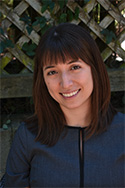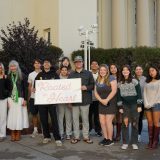
Dr. Richelle Tanner Awarded $494,256 NSF Grant
April 24, 2024
 Dr. Richelle Tanner (Environmental Science and Policy) was awarded a $494,256 National Science Foundation Leading Culture Change Through Professional Societies of Biology (BIO-LEAPS) grant to support the project, “Reforming organizational culture across Biology using a Community of Care framework.”
Dr. Richelle Tanner (Environmental Science and Policy) was awarded a $494,256 National Science Foundation Leading Culture Change Through Professional Societies of Biology (BIO-LEAPS) grant to support the project, “Reforming organizational culture across Biology using a Community of Care framework.”
What is the purpose of an academic conference?
The general consensus might be to learn, to share, or to develop one’s own knowledge. Dr. Tanner’s research seeks to change a conference culture that focuses nearly exclusively on insular, individual benefit, to one that seeks societal and community benefits.
To shift the dominant cultural values that influence how biologists view and use society conferences, Tanner argues that societies must expand from their “communities of practice,” which center on science, to incorporate “communities of care,” which center on people. Social networks and community growth are viewed as inevitable outcomes of scientific discourse rather than as a primary, explicit goal of societies and their conferences.
“We envision a culture in which scientific societies and their outward-facing units (journals and conferences) are valued primarily for their service to the membership in building equitable communities of scientists and in which participants seek out societies primarily for their role in facilitating and supporting connections among their members.” – Dr. Richelle Tanner
Using a modular, flexible approach rooted in sociological and psychological peer-reviewed research, Tanner’s project will eventually offer action plans to professional organization leaders who want sustainable ways to make their academic communities more diverse, inclusive, and equitable.
Tanner has developed and tested a three-stage approach for scientific society leadership that includes education, reflection, and guided action planning within this conceptual framework. In this proposal, Tanner will engage 5 US-based societies in a series of critically evaluated listening sessions, workshops, and events that are based on the three-stage approach but expand to address both internal structures (society leadership) and external structures (journal and conference organization). Using this approach, Tanner will coordinate the initial implementation and evaluations for actionable opportunities with “community of care”-guided goals in each of these scientific societies.
The guided action planning will draw from the expertise of existing evidence-based strategies developed in informal learning and corporate settings for community building, and hopefully generate broader interest in sustainable culture shifts within academic professional societies at large.

